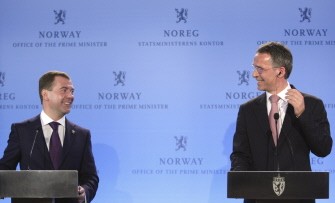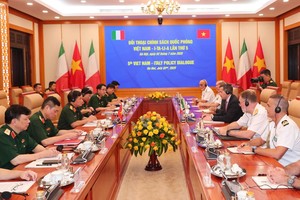The leaders of Russia and Norway said Tuesday they had agreed on a compromise Arctic border in the Barents Sea, ending a 40-year dispute over a region believed to contain vast oil and gas reserves.

"This solution is about more than a border line under the ocean. It is about developing good neighbour relations," Norwegian Prime Minister Jens Stoltenberg said at a joint press conference in Oslo with Russian President Dmitry Medvedev.
"It will unite much more than divide, and it will become a bridge to cooperation," he added.
Since 1970 Norway and the Soviet Union, and then Russia, have contested a 176,000-square-kilometre (67,950-square-mile) maritime area straddling their economic zones.
"I am glad that we have turned this page ... If problems are not solved definitively then there is friction which presents a strain," Medvedev told the press conference.
Canada, Denmark, Norway, Russia and the United States are at odds over how to divvy up the Arctic seabed, thought to hold 90 billion barrels of oil and 30 percent of the world's undiscovered gas resources, according to the US Geological Survey.
Rivalry over the Arctic riches has heated up as melting polar ice and new technologies have made the region more accessible.
The surprise accord announced Tuesday "shows that Norway and Russia are not conducting a policy centred on the rush for resources or on rivalry, but one centred on cooperation," Stoltenberg said.
The agreement, which he stressed was based on international maritime law, meant Russia and Norway would split almost equally the 176,000 square kilometres they had been contesting.
There are already several large projects underway to pump up vast fields of oil and natural gas outside the area split by Tuesday's agreement.
The massive Shtokman gas field is currently being developed on the Russian side while on the Norwegian side, the Snoehvit gas field is already on line and the Goliat oil field is being developed.








)















